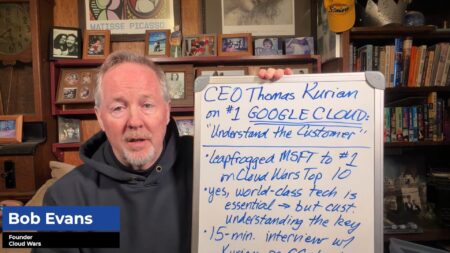
Oracle continues to be the world’s fastest-growing major cloud provider by a wide margin as its 45% cloud-growth rate put it well ahead of #2 Google Cloud’s 28% and #3 companies SAP and ServiceNow, which both came in at 24%.
Those numbers — along with most-recent quarterly results from the other Cloud Wars Top 10 companies — reveal that in spite of ongoing economic uncertainty and sharply restrained spending by most companies, business leaders continue to feel an existential need to move to the cloud to meet the expectations of today’s marketplace.
Here’s how the Cloud Wars Top 10 stacks up on cloud-revenue growth based on each company’s most recent quarterly numbers (and yes, I’ll update these later this month when fiscal-Q1 numbers come out for Salesforce, Workday, and Snowflake).
| Company | Cloud Growth | Cloud Revenue | Quarter |
| #1 Oracle | 45% | $4.1 billion | Feb. 28 |
| #2 Google Cloud | 28% | $7.5 billion | March 31 |
| #3 SAP (tie) | 24% | $2.5 billion | March 31 |
| #3 ServiceNow (tie) | 24% | $2.02 billion | March 31 |
| #5 Microsoft (tie) | 22% | $28.5 billion (subscription revenue) | March 31 |
| #5 Workday (tie) | 22% | $1.5 billion (subscription revenue) | March 31 |
| #7 AWS | 16% | $21.35 billion | March 31 |
| #8 Salesforce | 14% | $8.35 billion | Jan. 31 |
| #9 IBM | 10% (estimate) | $5.5 billion (estimate) | March 31 |
| #10 Snowflake | 54% | $555 million (product revenue) | Jan. 31 |
So, a few quick notes on some of these world-shaping companies:
- Microsoft: Really stands out with 22% growth on its massive revenue base — that’s a simply superb performance.
- IBM: Changed its revenue breakouts for Q1 by no longer specifying (a) overall cloud revenue for the quarter and (b) cloud revenue within each of its key business segments. So I’ve had to estimate its cloud-revenue growth for the quarter — I went with 10% based on its overall performance and comments from its leaders — but I also have to say I don’t think they made the decision to stop releasing cloud-revenue details because the numbers were so overwhelmingly wonderful. For quarterly revenue, I estimated $5.5 billion because IBM said its cloud revenue for the 12 months ending March 31 was $22 billion, and for that 12-month period, it cited a cloud-revenue growth rate of 15% in constant currency. For IBM’s companywide results, constant currency came in almost four points below actual, and that factor guided my estimate above of 10% for Q1.
- Snowflake: Posted product growth of 54% for the quarter and while that’s a superb number, I’m sticking with my established practice of the past couple of years by ranking Snowflake at the bottom of my growth-rate list until its quarterly revenue reaches $1 billion, which will put it in the ballpark of some of the other Cloud Wars Top 10 companies.
- Salesforce: That 14% figure is not a misprint. Now that Marc Benioff has converted from growth champion to value leader, gone are the days of relentlessly consistent quarterly growth in the range of 25% that set Salesforce apart for much of its 24-year history. Money managers and institutional investors seem to be happy here in the early days of the conversion, but we’ll see if the new and more-austere Salesforce can continue to dazzle customers and consistently win their business back as the company’s done in the past.
- Oracle: Now that we’re about to reach the anniversary of the Cerner acquisition, are the heady days of 40%-plus hypergrowth coming to an end for Oracle’s cloud business? Or will its explosive OCI infrastructure business (55% growth last quarter) and its booming cloud-applications business (spanning Fusion LOB apps, industry-specific apps, and NetSuite) keep Oracle’s cloud business growing far faster than any of its competitors?
- AWS: As I talked about the other day on a Cloud Wars Minute video, has AWS lost its growth mojo?
To hear practitioner and platform insights on how solutions such as ChatGPT will impact the future of work, customer experience, data strategy, and cybersecurity, make sure to register for your on-demand pass to Acceleration Economy’s Generative AI Digital Summit.








